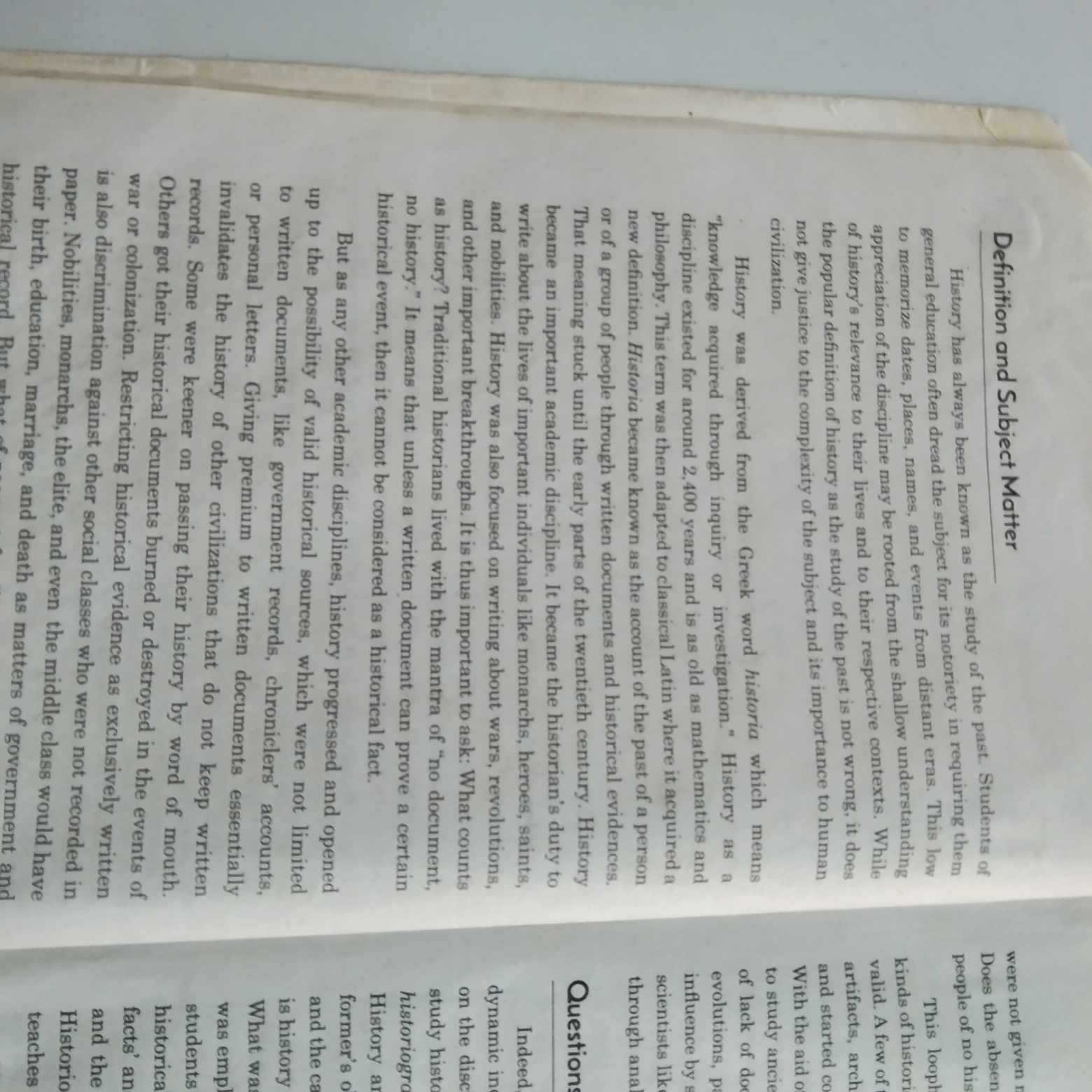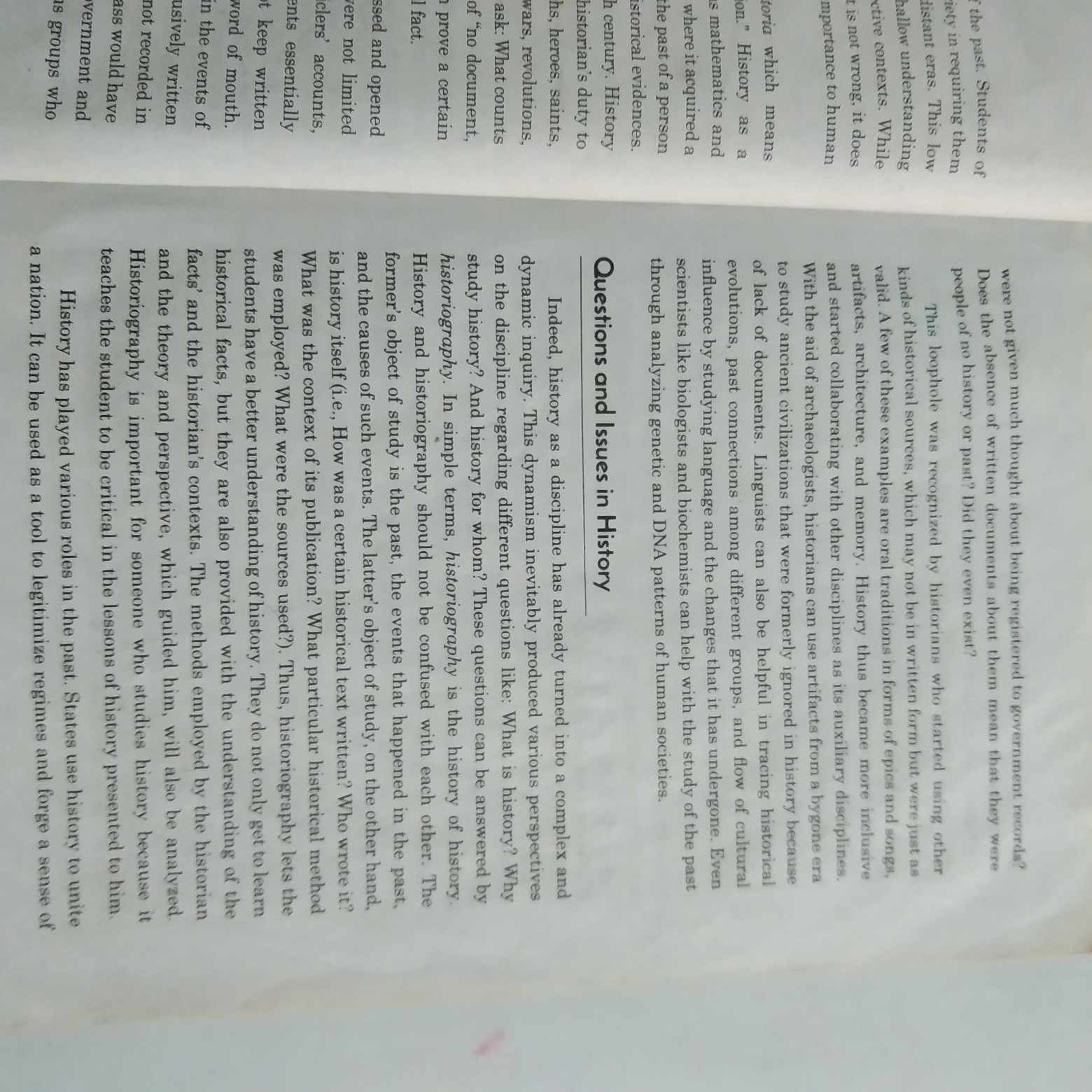Understanding History: Definition, Role, and Challenges
Notes on "Definition and Subject Matter"

-
Definition of History: History is derived from the Greek word 'historia', meaning inquiry or knowledge acquired through investigation.
- Thoughts: This emphasizes the importance of critical examination in understanding historical events.
- Additional Information: The scholarly approach to history involves not just collecting facts but interpreting them to understand their significance.
-
Role of Historians: Historians play a crucial role in interpreting historical events and making connections between the past and present.
- Thoughts: The interpretation can change over time as new evidence comes to light or as societal values shift.
- Additional Information: Historians are expected to provide context to historical events, making them relevant to contemporary issues.
-
Importance of Documentation: Historical documentation serves as the primary source of information on past events.
- Thoughts: The reliability of this documentation can vary, thus historians must assess sources for authenticity and bias.
- Additional Information: Different civilizations have different methods of recording history, from oral traditions to written documents.
-
Progression of Historical Knowledge: History as an academic discipline has evolved, with new methodologies and perspectives emerging over time.
- Thoughts: This indicates that history is not static; it is subject to reinterpretation based on current understanding.
- Additional Information: Various schools of thought—such as economic history, social history, or cultural history—reflect this dynamic nature.
-
Limits of Historical Evidence: Some aspects of history may not be recorded accurately or could be lost due to various circumstances, including natural disasters or intentional destruction.
- Thoughts: This creates gaps in our understanding, leading to the concept of ‘historical memory’ versus ‘historical fact’.
- Additional Information: The act of remembering history is selective and can be influenced by contemporary values and politics.
-
Questions for Further Exploration: The text hints at the need for questions to guide historical inquiry.
- Thoughts: Encouraging critical questions can lead to deeper insights into not only what happened but why it happened and its implications.
- Additional Information: Such questions might include exploring the viewpoints of marginalized groups in history or analyzing the impact of technological advancements over time.
Reference:
Questions and Issues in History

-
Evolution of Historical Inquiry
- History as a discipline has evolved and is influenced by various factors that shape the way historical events are interpreted. This reflects the dynamic nature of knowledge, which is not static but continuously re-evaluated as new evidence surfaces or as societal perspectives change.
-
Complexity of Historical Events
- Historical events cannot be viewed in isolation; they are interconnected. Understanding the broader context surrounding an event is essential to grasp its significance fully. This idea emphasizes that history is not merely a collection of dates and facts but a tapestry of interwoven narratives.
-
Methodological Approaches
- The text mentions various methods employed in historical studies, suggesting that historians use a range of perspectives and approaches to gain deeper insights. This not only includes traditional research methods but also contemporary approaches that might involve interdisciplinary collaboration, showing the evolution of historiography.
-
Role of Technology in History
- Reference to modern technologies and methodologies indicates that advancements like genetic analysis and digital archives are changing how history is studied. This can lead to new interpretations of historical facts and figures, expanding the scope of what historians can analyze.
-
Understanding the Impact of History
- There's an implied argument about how historical understanding can inform current issues. This relates to the idea that studying the past provides tools to address present challenges, making history relevant for modern society.
-
Critical Inquiry in History
- The text emphasizes the importance of questioning and critical thinking in history. Historians must ask pertinent questions to analyze sources effectively. This underscores the notion that history is not just about facts but involves critical analysis to understand motivations, consequences, and implications of events.
-
History's Role in Society
- It is suggested that history can be used to legitimize certain perspectives or power structures. This aspect encourages scrutiny of how history is presented and who benefits from historical narratives, highlighting the interplay between history and politics.
These notes collectively emphasize that history is a complex and evolving field that requires critical and interdisciplinary approaches, reflecting on how past events shape current realities and opinions.
Reference: